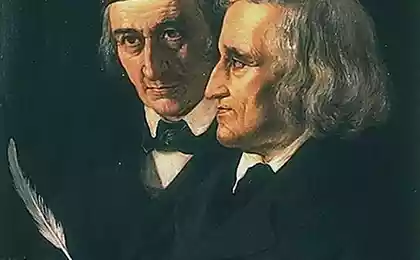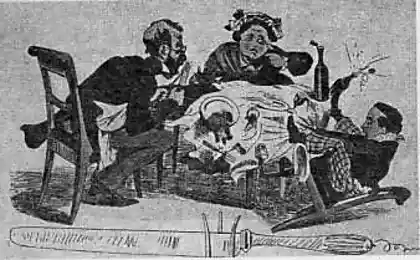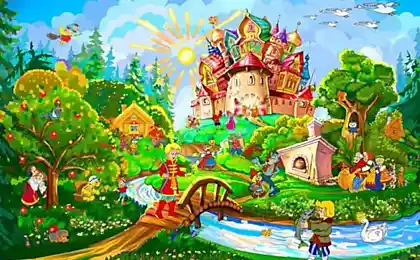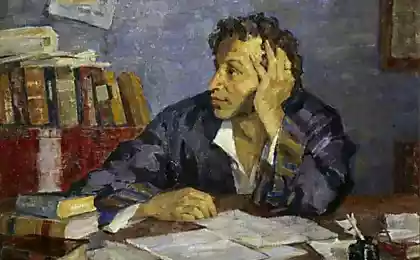1219
Terrifying tales
January 4, 1785 was born the famous German storyteller and scholar Jacob Grimm.
Grimm's history will forever remain only two, despite the fact that their families had as many as five sons. But it was Jacob and Wilhelm were among the brilliant minds of his time. If you do not take into account their popularity as a writer on the activities of the Brothers Grimm to the public, little is known. In fact, their legacy is not limited adapted to German folklore. Brothers interested in almost everything, one way or another associated with the language - from Scandinavian myths to the history of law. Wilhelm periods of creative activity alternated with a long break, mainly because of poor health. And this "father of German philology" can rightly be called exactly Jacob Grimm, whose life was in constant pursuit of knowledge.
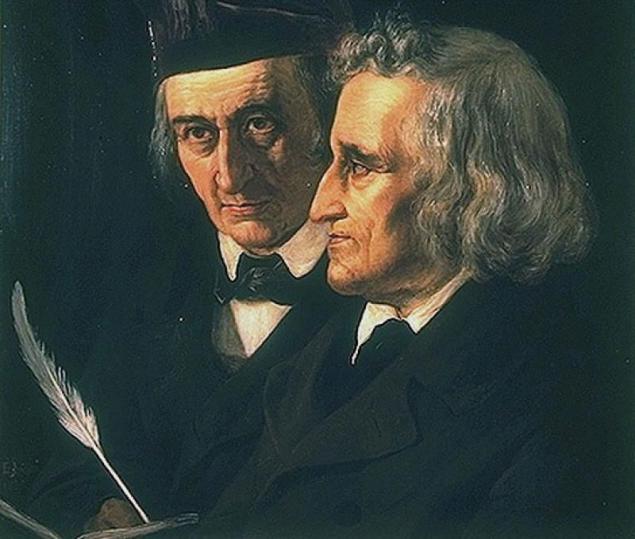
The brothers were born in quite a happy family. Jacob was only a year older than William, and from childhood the brothers were each other best friends. Common interests and love of science only strengthen friendship. Following the example of his late father's brothers decided to study law at the University of Marburskom. During his studies at the Faculty of Jacob realized that it no longer carries philology. After graduation, Jacob went to Paris where he met with philologists, collecting folk songs, legends and fairy tales. Jacob imbued with this idea and decided to do necessarily similar in Germany, of course, in the company of his younger brother.
In 1808, Jacob Grimm got a place at the personal librarian brother of Napoleon Bonaparte, Jerome, King of Westphalia. King liked young serious young man, and the library monarch looked rare, so nothing prevented Jacob engage in research. Therefore, four years later the brothers Grimm published their first volume of "Children and Family Tales", another three years - the second. In a few years there will be a collection of "German tradition". Due to a serious interest in the language allegedly abandoned a career diplomat. General duties were only a hindrance to Jacob. That's why he tried in every way to be a simple librarian, although he was offered a professorship with a good salary. Until 1820 the Brothers Grimm modest work in the library of Kassel, in which they can safely engage in philological studies.
Later, they agreed to teach at the University of Göttingen, where emotional Wilhelm had great success with students than older brother. Dryish and discreet Jacob never wanted to teach his only interested in science. However, at the University of the brothers made a lot of friends who share their interests, but all good finishes, and the brothers were fired in 1837 for refusing to swear allegiance to the King of Hanover.
In the history of linguistics Jacob Grimm came primarily as the author of four-volume "German grammar". The first volume is devoted to its morphology and phonetics, the second - mostly morphology, the third - and fourth word-formation - syntax. At the heart of this study is to compare the historical basis of all Germanic languages, covering vast material from the first written records.
Jacob and Wilhelm did incredibly hard work, creating a "German Dictionary" and "German grammar". One only preparatory work took 14 years! But their vocabulary is still considered a unique publication that has no analogues.
Still, the Brothers Grimm for us first of all it storytellers. Parents usually do not realize that their children are reading a very mild version. Jacob and Wilhelm were explorers and tried to burn to hear the story word for word. Therefore, their tales rather violent than instructive. On the day of the birth of Jacob Grimm "Vyachorka" gathered five tales that are worth reading just for adults.
1. "The girl without hands" (1812)
Once the miller asked the devil wealth, and he asked instead that the miller of the house. There was the miller's daughter, that the devil tried to steal, but she was too pure soul, so take it with you into hell Satan could not. Then he ordered the miller's daughter cut off his hands. Melnik obediently chops off the hands of the girl, and then she leaves the house, wandering until she falls in love not the king, who takes her as his wife. They have a son, and the king, meanwhile, is fighting in a faraway country. Devil replaces letters, and the king received the news that his wife gave birth to a puppy. Unclean will change and the response of the king and queen expelled. She lives with her son in the forest, her hands grow, and seven years later the king finds her and they go back to the palace. A certain embodiments of this tale miller's daughter chops off the hands and chest because she refuses to marry him.
2. "The Thief and The Damned" (1815)
The title of this tale to use words denoting the same time and "thief" and "Jew". Fry buys a magic flute, and everyone who hears it, breaks into a dance. A boy finds a Jew (Jew whose name) and makes it dance on the bramble bush until he gives him all the money. Boy want to hang, but he takes out his flute and not stop playing until Jew admits that he himself had stolen gold. Jew, of course, be executed.
3. "The Robber Bridegroom" (1812)
The groom one girl lives far in the woods Crying, in an eerie house. Home his girlfriend finds, and saddened, walks around the house. Suddenly the girl fits old woman who says her favorite - really cruel ogre, who lures the girls to himself, and after -sedaet. Of course, she does not believe the old woman and then hides it. When the bride comes home with another terrified victim, brutally killing and eating right raw, the girl opened her eyes. She escapes from the terrible huts and ponders how to deal with the killer. Thinking girl groom invites to dinner at his father's house. Cannibal comes, hoping soon to get another delicious victim. And then he grabs the police.
4. "The Juniper Tree»
Wicked stepmother-stepson Queen offers an apple. In order to take it, the boy must get into a giant chest. When he opens the trunk, stepmother chops off his head cover. Wanting to disguise the crime, she ties the boy's head to the body with a handkerchief. But soon the head knocks her own daughter, who is now convinced that the blame for the death of half-brother. The Queen and her daughter come up with a cunning plan, prepare the body and blood pudding is served for dinner the king. But the soul of the boy turns into a bird, and, driven by vengeance, stepmother throws a large rock on his head, which kills it in place.
5. "The poor boy in the grave" (1843)
Orphan boy enters the house of a wealthy couple. Those beaten him, starved, and in every way mock baby. Then he decides to kill herself. But he is an uneducated orphan boy, so do not know what it looks like poison and what it tastes like. Therefore, instead of poison he eats honey and drinking wine. Confident that he was fatally poisoned, fed and drunk boy to go to the grave, preparing for death and dying.
--img2--
Source: vmdaily.ru
Grimm's history will forever remain only two, despite the fact that their families had as many as five sons. But it was Jacob and Wilhelm were among the brilliant minds of his time. If you do not take into account their popularity as a writer on the activities of the Brothers Grimm to the public, little is known. In fact, their legacy is not limited adapted to German folklore. Brothers interested in almost everything, one way or another associated with the language - from Scandinavian myths to the history of law. Wilhelm periods of creative activity alternated with a long break, mainly because of poor health. And this "father of German philology" can rightly be called exactly Jacob Grimm, whose life was in constant pursuit of knowledge.

The brothers were born in quite a happy family. Jacob was only a year older than William, and from childhood the brothers were each other best friends. Common interests and love of science only strengthen friendship. Following the example of his late father's brothers decided to study law at the University of Marburskom. During his studies at the Faculty of Jacob realized that it no longer carries philology. After graduation, Jacob went to Paris where he met with philologists, collecting folk songs, legends and fairy tales. Jacob imbued with this idea and decided to do necessarily similar in Germany, of course, in the company of his younger brother.
In 1808, Jacob Grimm got a place at the personal librarian brother of Napoleon Bonaparte, Jerome, King of Westphalia. King liked young serious young man, and the library monarch looked rare, so nothing prevented Jacob engage in research. Therefore, four years later the brothers Grimm published their first volume of "Children and Family Tales", another three years - the second. In a few years there will be a collection of "German tradition". Due to a serious interest in the language allegedly abandoned a career diplomat. General duties were only a hindrance to Jacob. That's why he tried in every way to be a simple librarian, although he was offered a professorship with a good salary. Until 1820 the Brothers Grimm modest work in the library of Kassel, in which they can safely engage in philological studies.
Later, they agreed to teach at the University of Göttingen, where emotional Wilhelm had great success with students than older brother. Dryish and discreet Jacob never wanted to teach his only interested in science. However, at the University of the brothers made a lot of friends who share their interests, but all good finishes, and the brothers were fired in 1837 for refusing to swear allegiance to the King of Hanover.
In the history of linguistics Jacob Grimm came primarily as the author of four-volume "German grammar". The first volume is devoted to its morphology and phonetics, the second - mostly morphology, the third - and fourth word-formation - syntax. At the heart of this study is to compare the historical basis of all Germanic languages, covering vast material from the first written records.
Jacob and Wilhelm did incredibly hard work, creating a "German Dictionary" and "German grammar". One only preparatory work took 14 years! But their vocabulary is still considered a unique publication that has no analogues.
Still, the Brothers Grimm for us first of all it storytellers. Parents usually do not realize that their children are reading a very mild version. Jacob and Wilhelm were explorers and tried to burn to hear the story word for word. Therefore, their tales rather violent than instructive. On the day of the birth of Jacob Grimm "Vyachorka" gathered five tales that are worth reading just for adults.
1. "The girl without hands" (1812)
Once the miller asked the devil wealth, and he asked instead that the miller of the house. There was the miller's daughter, that the devil tried to steal, but she was too pure soul, so take it with you into hell Satan could not. Then he ordered the miller's daughter cut off his hands. Melnik obediently chops off the hands of the girl, and then she leaves the house, wandering until she falls in love not the king, who takes her as his wife. They have a son, and the king, meanwhile, is fighting in a faraway country. Devil replaces letters, and the king received the news that his wife gave birth to a puppy. Unclean will change and the response of the king and queen expelled. She lives with her son in the forest, her hands grow, and seven years later the king finds her and they go back to the palace. A certain embodiments of this tale miller's daughter chops off the hands and chest because she refuses to marry him.
2. "The Thief and The Damned" (1815)
The title of this tale to use words denoting the same time and "thief" and "Jew". Fry buys a magic flute, and everyone who hears it, breaks into a dance. A boy finds a Jew (Jew whose name) and makes it dance on the bramble bush until he gives him all the money. Boy want to hang, but he takes out his flute and not stop playing until Jew admits that he himself had stolen gold. Jew, of course, be executed.
3. "The Robber Bridegroom" (1812)
The groom one girl lives far in the woods Crying, in an eerie house. Home his girlfriend finds, and saddened, walks around the house. Suddenly the girl fits old woman who says her favorite - really cruel ogre, who lures the girls to himself, and after -sedaet. Of course, she does not believe the old woman and then hides it. When the bride comes home with another terrified victim, brutally killing and eating right raw, the girl opened her eyes. She escapes from the terrible huts and ponders how to deal with the killer. Thinking girl groom invites to dinner at his father's house. Cannibal comes, hoping soon to get another delicious victim. And then he grabs the police.
4. "The Juniper Tree»
Wicked stepmother-stepson Queen offers an apple. In order to take it, the boy must get into a giant chest. When he opens the trunk, stepmother chops off his head cover. Wanting to disguise the crime, she ties the boy's head to the body with a handkerchief. But soon the head knocks her own daughter, who is now convinced that the blame for the death of half-brother. The Queen and her daughter come up with a cunning plan, prepare the body and blood pudding is served for dinner the king. But the soul of the boy turns into a bird, and, driven by vengeance, stepmother throws a large rock on his head, which kills it in place.
5. "The poor boy in the grave" (1843)
Orphan boy enters the house of a wealthy couple. Those beaten him, starved, and in every way mock baby. Then he decides to kill herself. But he is an uneducated orphan boy, so do not know what it looks like poison and what it tastes like. Therefore, instead of poison he eats honey and drinking wine. Confident that he was fatally poisoned, fed and drunk boy to go to the grave, preparing for death and dying.
--img2--
Source: vmdaily.ru
